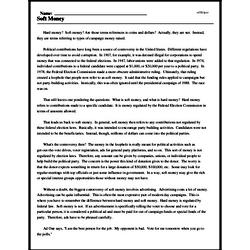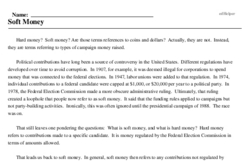Soft Money
Hard money? Soft money? Are those terms references to coins and dollars? Actually, they are not. Instead, they are terms referring to types of campaign money raised.
Political contributions have long been a source of controversy in the United States. Different regulations have developed over time to avoid corruption. In 1907, for example, it was deemed illegal for corporations to spend money that was connected to the federal elections. In 1947, labor unions were added to that regulation. In 1974, individual contributions to a federal candidate were capped at $1,000, or $20,000 per year to a political party. In 1978, the Federal Election Commission made a more obscure administrative ruling. Ultimately, that ruling created a loophole that people now refer to as soft money. It said that the funding rules applied to campaigns but not party-building activities. Ironically, this was often ignored until the presidential campaign of 1988. The race was on.
That still leaves one pondering the questions: What is soft money, and what is hard money? Hard money refers to contributions made to a specific candidate. It is money regulated by the Federal Election Commission in terms of amounts allowed.
That leads us back to soft money. In general, soft money then refers to any contributions not regulated by these federal election laws. Basically, it was intended to encourage party building activities. Candidates were not intended to be the beneficiaries. Instead, though, millions of dollars can come into the political parties.
What's the controversy then? The money in the loophole is really meant for political activities such as get-out-the-vote drives, voter registration, ads for general party platforms, and so on. This sort of money is not regulated by election laws. Therefore, any amount can be given by companies, unions, or individual people to help build the political party. The concern is the power this kind of donation gives to the donor. The worry is that the donor expects something in return for a large donation of $50,000, $100,000, etc. Some may look for regular meetings with top officials or just some influence in government. In a way, soft money may give the rich or special interest groups opportunities those without money may not have.




